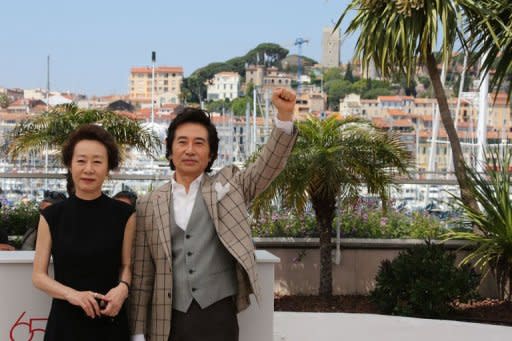S.Korean Cannes contender blasts homegrown corruption
A sex-infused expose of rampant corruption among the super-rich in today's South Korea premiered at Cannes Film Festival, but the director slammed the Western view of Asian cinema. Im Sang-Soo presented his seventh film "The Taste of Money", one of 22 in the race for the Cannes top prize to be awarded Sunday at a gala ceremony. It is only the second entry from Asia, following fellow Korean Hong Sang-soo's "In Another Country" starring Isabelle Huppert. "The Taste of Money" is the follow-up to the 2010 Cannes contender "The Housemaid" tracing the saga of a massively wealthy but highly dysfunctional family and the decent but compromised people who work for them. The clan's patriarch is addicted to sex with the servants and openly indulges his appetites, feeling his way up the Filipina housekeeper Eva's skirt at the family dinner table and later ravishing her in his bedroom which his wife has equipped with spy cameras. The domineering wife has long tolerated his womanising but when her husband declares that he will give up everything to live with Eva and her two children, whom he has flown in to Korea from the Philippines, she swings into action. Coercing her husband's handsome young assistant into her bed, she then uses the employee to consolidate the power of the family empire and exact revenge on her husband, known as the Chairman. The soap opera unfolds in the family's sumptuous ultra-modern estate, where the walls are covered in contemporary Western art and the French red wine flows freely. Im told AFP that he took inspiration from Balzac, Shakespeare and Hitchcock in constructing his portrait of South Korea's current infatuation with money and the corrosive influence of excessive power. "The view of South Korean society I present is sad but true. At the moment you have big companies like Samsung and Hyundai operating without any sense of their own responsibilities in Korean society," he said. "I wanted to show how ordinary people live in that society and who are they are in this context." Im said that the specifically South Korean themes in the film must be seen in a global context, with Westerners as role models and poor newcomers from other parts of Asia are there to be exploited. "The ultra-rich in Korea see themselves as emperors. But their history only goes back 50 years so they seek to imitate European aristocrats," he said. "The problems in South Korea also have an international aspect because the lowest rung of South Korean society is occupied by immigrants -- in the case of the film, Filipinos." Im is known for lengthy soft-core sex scenes with all the main characters winding up in at least one steamy tryst. "I was sick and tired of filming love scenes in the same way," he said. "This time I wanted to film them with a touch of humour." Without citing examples, Im said he generally "detested" the type of Asian cinema celebrated at international festivals like Cannes, which delivered a view of the continent that appealed to Western fantasies. "I have no intention of insulting the other Asian directors invited to Cannes but I have noticed that the Cannes selection is often marked by Orientalism, in other words an Asian aesthetic focused on the exotic," he said. Im argued that a failure to look at other cultures on their own terms helped breed the rage that fed international terrorism. "This separation from The Other is the reason why you had September 11 attacks because they (Westerners) did not really want to know what happens in other countries," he said.



